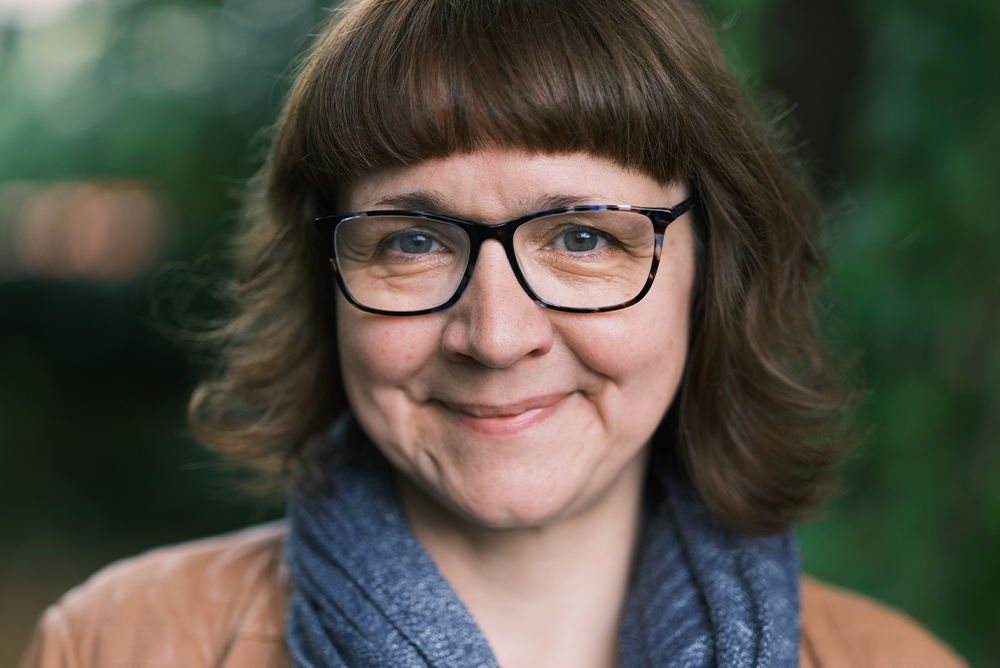
Courtesy of Emma Must.
Emma Must is a poet living in Belfast. Formerly a full-time environmental campaigner, she was awarded the 1995 Goldman Environmental Prize for Europe for her efforts towards land conservation. She has a PhD in English from Queen’s University Belfast, where she focused on ecopoetry and ecocriticism. Her first full-length poetry collection The Ballad of Yellow Wednesday has been longlisted for the 2023 Laurel Prize and Highly Commended in the 2023 Forward Prizes for Poetry. Zócalo’s poetry curator for January, Must chatted with us about walking along the River Lagan, her earliest creative writing memory, and the inspiring Irish spoken-word film Ó Bhéal.
How has the pandemic affected the way you think or write poetry?
I don’t think the pandemic really changed my ongoing practice as a poet. Maybe poets are quite resilient in that way because we’re kind of doing this stuff anyway. During the first year of the pandemic, I was actually writing the critical component of my PhD. I was at home on my own, writing on a pretty tight deadline, so I was grateful to have to focus on the critical component. So it was quite an unusual year in that way.
Besides the poets you’ve curated for us, who is a poet you’re reading at the moment?
I’m on my second reading of Nick Laird’s latest collection Up Late. His poems have such emotional depth and this is communicated through his very un-showy, up-to-the-minute language and his absolutely masterful use of form; the extended syntax of some of his longer poems just made me sigh with joy. Also, just a quick mention, I’m reading two others: Linda France’s Startling, which is just so visionary and clear-sighted, and Grace Wells’ latest collection [The Church of the Love of the World].
What do you do to decompress?
I walk along the River Lagan, which is not far from my house in Belfast. It’s just so beautiful all times of the day and at night with the lights. You can always spot something new there. Yesterday, it was the way in which the black-headed gulls glided down the river backwards, and they rotated from side to side.
What is your earliest creative writing memory?
Age 7, with Brownies in Otterbourne in Hampshire: I got into a tussle with the writer badge assessor over my use of the word teasel, and she said it wasn’t a word, and I knew it was a word, because I had seen these kinds of spiky heads on my walks along the River Itchen. But then after that, when I was about 10, I got Highly Commended in a Daily Mirror [poetry competition for kids] for a poem about electricity pylons, and it was imaginatively titled “Metal Giants.” As I recall, they were striding across the countryside in never-ending lines and with their red eyes shining like hot coals.
What’s your favorite food to have this time of the year?
I really like burritos but the local chippy, which does brilliant burritos, has just had a big fire, so I can’t get them. So what else? I make quite a lot of vegetable and bean stew, which I really like making if I need one.
Let’s play a game we call “Survive, Thrive, or Die” with different environments: mountains, deserts, and forests. (“Survive” as in barely getting by; “Thrive” as in doing well; and “Die” as in not making it.)
Mountains: Survive. I might struggle a little bit. I don’t like rock climbing, which terrifies me.
Deserts: Thrive. I worked and taught in Chihuahua in Mexico a couple of times, and I just loved it.
Forests: Thrive. I really like deserts and forests equally, so I think mountains are the only place I might struggle a bit.
What’s a survival tip for the forest?
Make a shelter—I used to live in a woods with no electricity or fossil fuel or running water, so I definitely know I can survive living in the forest. Shelter and heat, as it can get so cold.
What’s the strangest job you’ve ever had?
The night shift of the canteen of the car manufacturer Ford in Southampton. I was earning money to fund my first degree.
What’s the last thing that moved you?
An Irish spoken-word film Ó Bhéal—that means, in English, “From Mouth,” or oral. I went to see it on the off chance at our local cinema. The film is about the ways in which younger Irish spoken-word poets are marrying hip-hop with traditional Irish song and dance, and it was terrific. There was nobody in the cinema, just me, that Saturday afternoon. And there was this one poem called “Sorrow” by Strange Boy, a performer and poet from Limerick in the Republic, and it just left me in pieces. I just sat in this empty cinema with tears running down my face. It was so moving and very inspiring.



